There are many reasons for falling behind in school. Individual failures usually occur in those schools that do not strive to adapt to the needs and level of each student, in which children are treated harshly, demanding unconditional obedience from them. Where the cool groups are too big for individual approach.
The reasons for poor performance may lie within the child himself. They may be hidden in his health: poor vision or hearing, fatigue or a chronic illness.
The reason may be mental condition child: nervousness and anxiety about any reason, inability to find mutual language with the teacher or students. It happens that a child does not read well because it is difficult for him to recognize written words. One child does not work because the tasks are too easy for him, another because it is too difficult.
Do not scold or punish a child who has problems with his studies. Try to find out what is the reason for his poor performance. Consult your teacher or school principal, or educational consultant if you have one. Check your child's health, including vision and hearing.
Very capable child
If in a class all students work according to the same program, then more capable children may be bored because the tasks are too easy for them. The only way out of the situation may be to move to a higher class.
It may turn out good decision, if the child is both physically and spiritually more developed than his peers. Otherwise, he will be isolated and lonely among his classmates, especially when they enter adolescence. He may be too puny for sports games and dancing. The child's interests are most likely determined by his age, which prevents him from finding a common language with new friends. What good will it do him to go to college at a very young age if it means he will always be alone?
For such a bright child, it is better to remain in his class with his peers, provided that the curriculum is too flexible, that is, it can be made more challenging for bright children. He can be assigned to work through a more difficult book in the library and make a report on it.
If a capable student works for grades or to please the teacher, the guys give him the nicknames “Smart Guy”, “Favorite”. But if he's working on common theme, together with the entire team, the guys’ respect for him grows, because his intelligence and abilities turn out to be especially useful in the common cause.
Even if you consider your child to be very talented, do not seek to transfer him to a higher class that does not correspond to his abilities. As a result, the child will study worse than he could, or even simply repeat the year, returning to his class.
The question also arises whether smart children should be taught to read and count before school. Parents say that often children themselves ask to show them letters and numbers and are simply asking to be taught. This is partly true, and there is no harm in satisfying a child's curiosity.
But in many of these cases there is another side. Often parents have too high expectations for their child and want him to excel other children. When he plays his children's games, they take it calmly. But as soon as he shows interest in reading, they light up and enthusiastically help the child learn to read. The child, seeing his parents’ delight, responds with even greater interest. This can completely distract him from the natural activities of his age and turn him into a “literate” earlier than necessary.
For good parents It is natural to rejoice in the wonderful qualities of your children. But it is necessary to distinguish where the interests of the child end and the high hopes of the parents begin. If parents are ambitious by nature, they must be honest with themselves and be careful not to let their ambition rule the child's life.
For the child to grow up happy man and became the pride of his parents, they should not put pressure on him at any age, be it about school activities, music or dance lessons, sports or choosing friends.
Poor academic performance due to nervousness. A child's studies can be hampered by various worries, troubles and family troubles. Here are a few examples, although they do not exhaust all possibilities.
A six-year-old girl is tormented by feelings of jealousy towards her younger brother. This makes her nervous and distracts her from her studies. Sometimes she suddenly attacks other children for no apparent reason.
The child may be upset about the illness of a family member, or a parent's threat to leave, or a misunderstood sexual relationship. In the first years at school, a child may be afraid of a bully or angry dog on the way to school, or a strict teacher, afraid to ask permission to go to the toilet or answer a lesson in front of the whole class. For an adult, this may all seem like nothing, but for a shy 6-7 year old child, such things can cause strong fear, which completely paralyzes his ability to think.
A nine-year-old child who is severely scolded and punished at home may become extremely anxious and tense and lose the ability to hold his thoughts on anything.
Usually a child who is considered "lazy" is not lazy at all. A person is born inquisitive and energetic. If later he loses these qualities, then upbringing is to blame. The reasons for apparent laziness are varied. A child may simply be stubborn because he has been constantly pushed since birth. But he is not lazy when it comes to his personal hobbies. Sometimes a child is simply hesitant to try something out of fear of failure. This quality develops in a child whose parents have always been too critical of his achievements or have demanded too much from him.
Sometimes a child who is too conscientious learns poorly, no matter how strange it may sound. He repeats a lesson he has already learned or an exercise he has done many times in fear that he missed something or did something wrong. Such a child always lags behind his friends because of his excessive fussiness.
A child deprived of love and care early childhood, by school age, as a rule, he becomes nervous, restless, irresponsible, unable to become interested in studies, find a common language with teachers and classmates.
Whatever the reason for the child’s poor performance, it is necessary
firstly, to find the internal reason for his failure;
secondly, regardless of whether you are able to find it or not, the teacher and parents, combining their knowledge about the child, must reveal it good qualities and interests and, using them, gradually draw the child into the team and its activities.
Poor reading due to slow development of visual memory. For both you and me, the word “nose” looks completely different from the words “sleep”. But for most young children just beginning to read, these pairs of words look almost the same.
They can read the word "ditch" as "thief" or the word "weight" as "sev". When writing, they often confuse letters that are similar in spelling. Over time, such errors become very rare. But approximately 10% of students (mostly boys) continue to suffer from this deficiency for several years. It takes them longer to learn to read relatively well, and they can make spelling mistakes throughout their lives, no matter how much practice they have. These children quickly come to the conclusion that they are "incapable" and often begin to hate school because they cannot keep up with the class. They need to be reassured and dissuaded that their problem is a special defect in visual memory (as well as the lack musical ear), that they are not stupid or lazy, that sooner or later they will learn to read well and write correctly.
Help with classes
Sometimes the teacher advises you to give your child extra work in those subjects in which he is lagging behind. In some cases, parents themselves decide to “pull up” the child. This must be done with caution. Often parents turn out to be bad teachers not because they lack knowledge, and not because they are unscrupulous, but because they take the child’s successes too personally and get angry if he does not understand something. When a child is already confused about a subject, a nervous parent will only make matters worse. In addition, the parent may explain it differently than the teacher, which will further confuse the child who did not understand the topic in class.
I don't want to say that parents should never help their children in their studies. Sometimes their help brings very good results. But before you work with your child, consult with his teacher. Stop your private lessons immediately if they are not successful.
When a child occasionally turns to you asking for help in completing homework, there is nothing wrong if you explain to him what he does not understand (nothing gives parents more pleasure than the opportunity to demonstrate their knowledge to their child). But if a child asks you to do it for him homework, because he does not understand it, consult the teacher.
A good teacher prefers to help the child understand the topic so that he can then complete the task on his own. If the teacher is too busy to individual lessons with a child, the parents will have to help him themselves, but even in this case, try to ensure that the child understands the task and does it himself. Don't do his homework for him.
Fear of going to school
Sometimes a child suddenly develops an inexplicable fear of school and refuses to go there. This often occurs after he has been at home for several days due to illness or an accident, especially if the onset of the illness or accident took place at school. As a rule, a child cannot explain what he is afraid of at school. Studies of such cases have shown that the actual cause of fear often has nothing to do with school.
If you allow a child to stay at home, his fear of school will only increase and will be supplemented by the fear of falling behind the school curriculum and causing the displeasure of the teacher and classmates. Therefore, parents must be firm and insist on the child returning to school. Do not let him deceive you with health complaints, do not try to persuade the doctor to allow him to stay away from school for a few more days (of course, the doctor must check his health).
If your child cannot eat before going to school
Occasionally, this problem arises, especially with 1st and 2nd grade students at the beginning of the school year. A conscientious child may be so in awe of the class and the teacher that it completely robs him of his appetite for going to school. If his mother forces him to eat, he may vomit on the way to school or in class, adding to his other troubles a feeling of shame.
Don't force your child to eat in the morning. Let him drink juice or milk if that's all his stomach can handle. If a child cannot even drink, let him go to school with an empty stomach. Of course, this is not good, but he would rather get rid of his nervous tension and will be able to eat breakfast before class if you leave him alone. Typically, such a child eats very well at lunch and even better at dinner, making up for the missed breakfast. As he gets used to school, his stomach will require more and more food in the morning, provided he does not have to fight with his mother.
For a shy child, the teacher's sensitivity is especially important. The mother can talk to the teacher and explain the situation to him. The teacher will try to be especially affectionate with the child and help him get used to the team.
Teacher and parents
It's not hard for you to stay in good relations with a teacher if your child is a great student. But if he studies poorly, relationships with teachers may become difficult. The most best teachers, just like the most best parents, are just people. Each of them takes pride in their work. Each of them experiences possessive feelings towards the child. Everyone believes in their hearts (rightly or wrongly) that the child would have achieved much better results if the other party had treated him a little differently.
Parents should remember that the teacher is just as touchy as they are, and that they will get much more out of their discussions if they are friendly and accommodating. Some parents admit that they are scared to appear in front of the teacher, but then the teacher is often scared to appear in front of the parents. The task of parents in a conversation with a teacher is to give him information about the child’s interests and his reaction to various phenomena. And the teacher himself will decide how to use this information. Don't forget to thank the teacher for teaching topics that your child especially likes and enjoys.
Parents often wonder what to do if their child is doing poorly at school. And no less often, such questions and concerns arise not even in connection with poor academic performance, but only with a certain tendency towards a decrease in academic performance. It is quite natural that conscientious parents would like to avoid such a turn of events or correct it in time.
According to general statistics, about 20% of schoolchildren have unsatisfactory grades in several subjects, and sometimes this is accompanied by the fact that the child behaves poorly at school. In addition, you don’t need to study statistics to understand what else more schoolchildren have a reduced desire to study, be it general education, music or any other school. It is only thanks to teachers, parents or self-discipline that this reluctance to learn does not affect the process of education itself. And many parents would like to achieve such a result.
But before you act, it is important to understand why the child is doing poorly in school and what factors create this state of affairs.
The situation described above has several components, each of which has a direct impact on it and can become the main reason for its deterioration. These are factors such as:
- poor child health;
- lack of necessary education;
- difficult home environment;
- low qualification of the teacher;
- nuances of the education system itself;
- individual characteristics of the child.
Poor health in children is quite common today. In rare cases, this is due to heredity, more often - with a previous illness, the influence of antibiotics or vaccinations, if they were used without taking into account contraindications. The quality of nutrition has a great influence on the child’s health - the necessary vitamins and microelements must be in sufficient quantities in the student’s diet. At the same time, food should not be contaminated; it should not contain an abundance of harmful additives and ingredients, which modern society very common. These factors have direct relation to the child’s attentiveness, memory, vital activity and positive attitude and, as a result, to the ability to perceive new information.
In addition, poor health may cause the other factors described below to become more pronounced.
Family and socialization
Education is of great importance! It is necessary from an early age and should form important qualities in the child. These qualities must be manifested in right time and become the basis of the future, independent life adult. Among these qualities there is self-discipline, which means a developed will, interest in understanding the world around us, respect for people who are wise in life, correct life values and other factors. Of course, it is impossible to demand the appearance of these advantages in a child instantly, and it is not necessary. Character is formed gradually, and this formation is impossible without the interested participation of the person himself.
A difficult home environment can throw a child off track and make it difficult for him to get back into it. Circumstances relevant to such a situation may involve death loved one, the destructive influence of one of the parents or other family members, and the like. Another circumstance may be, and is often a consequence of such changes. During this period, a reassessment of many events and values occurs, which can be quite difficult if the child does not have the “immunity” inherent in proper upbringing.
Difficult relationships with peers can arise for several reasons, including the character of the child himself, how he was raised, and whether he was able to adapt to a particular team, how he can behave among other children. Often difficulties arise due to a discrepancy between the levels of development and upbringing in children, for example, when there are bullies in the class who demonstrate bad behavior at school and thereby negatively influence other children.
Features of the education system
Many circumstances in the learning process depend on the teacher, and this is natural. It is likely that a particular teacher does not have the high calling to be someone who knows how to convey knowledge, and therefore can, for subjective reasons, serve as a stumbling block that will prevent the student from mastering the subject. And it happens that such a situation permanently discourages the child’s interest in the learning process.
It must be recognized that a teacher is also a representative of a system that is far from ideal. And if such a teacher puts the interests of this system above the issues of raising and educating children, if he does not have a sensitive heart and does not have the ability to choose individual keys, then he may turn out to be an ordinary bureaucrat with all the “ensuing” consequences for children.
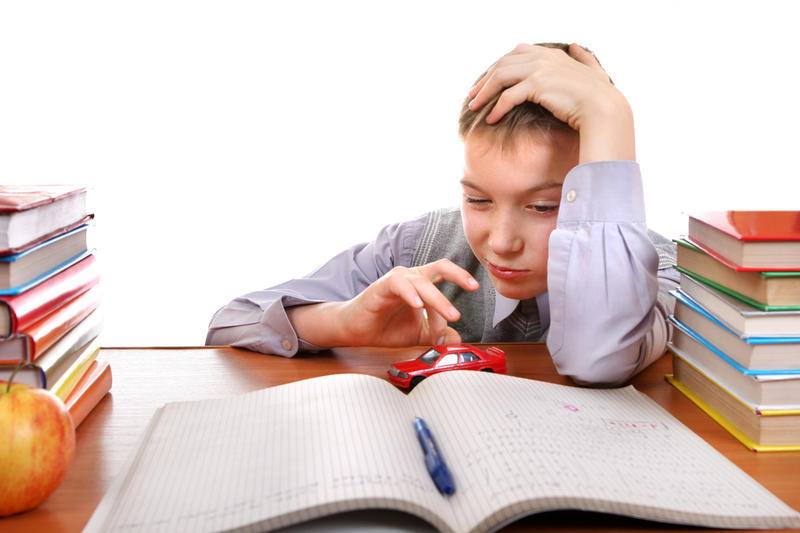
One of the system factors modern learning, which has a negative sign, is to motivate students not so much to acquire specific knowledge as to get the required grades. And if you think about it, here you can see a big “pitfall” that can affect the process of development and learning of a child, his knowledge of the world. If a schoolchild who is healthy has necessary qualities and inquisitive, they will force you to receive only the necessary grades, which are given for actions that are far from natural process knowledge real world(for example, memorizing dates or names of extinct animals, etc.), then this child’s interest in school will naturally decrease.
Features of children's characters
Psychologists know about 4 human psychotypes. These psychological characteristics are known to be present in children. If we summarize them all, the situations may look something like this. Some of the guys are inclined towards the exact sciences, while others are drawn towards the humanities. Some people quickly grasp new things and then get bored, while others need to return to the material they have covered more than once. This leads to the fact that, as a result of individual characteristics, some of the children cease to succeed in any subject. But this does not mean that the child does not like this subject or does not want to learn - he simply does not keep up with the speed of the teacher’s presentation of information and tasks on a specific subject.
It’s worse if parents start to get involved and lead this race, worry about “academic performance,” considering it the basis of a good grade. This attitude of the parents can be transmitted to the student and become fixed in his consciousness, and as a result - his individual attitude to master a specific subject or specific area in life will be perceived by him as “wrong” and slow down the process of acquiring knowledge.

Of course, all of the above factors rarely manifest themselves clearly in one person. Most often, the life and character of a schoolchild, including both individual characteristics and acquired qualities, are also influenced by circumstances external to the child. In this regard, it is sometimes difficult for parents to understand their child, about whom they seemed to know everything, but suddenly (for them) he changed his behavior.
What should parents do?
First of all, every parent who is sincerely concerned about the development of their child should try to carefully understand what is happening and the reasons for the current situation. It is very important to do this together with the child, but without any pressure. He must be an interested participant, understanding and accepting the sincere concern of the parent, which, of course, is not easy to achieve. Parents need to try to look at the situation objectively. They must understand the difference between assessment and knowledge, have a complete understanding of classmates and teachers at school, and be able to objectively look at their role in education. A true understanding of each negative factor and the entire situation as a whole can be called half the success in solving it.
In addition to eliminating negative factors, we can recommend active actions in a positive way. One such “magic key” with which you can transform a child is the formation of a psychology of success in him. Moreover, this success should be associated primarily with the joy of the process and achieving the result, and only secondarily with evaluation or reward, which should never be an end in itself. And what matters here is whether the child believes in himself. All children initially, it is thanks to this that they manage to learn about the world, starting this knowledge from the first step. Moreover, every day they overcome the border of the familiar, moving into the zone of the unknown, which requires inner courage and mandatory confidence in the support of loved ones.

A practical example would be the following situation. Every student probably has a favorite subject or area of activity that interests him. By encouraging and developing this interest, it is necessary to motivate the child to go beyond the boundaries of his preference, showing connections with other aspects of life. So, the Russian language, unloved by many boys, is actually very logical! It beautifully and strictly reflects the life around us, every little detail. Or, for example, such a seemingly humanitarian subject as geography has many connections with any technical area. In this way, each school subject can be linked to a harmonious system of reality and the necessary transitions to other disciplines can be found. Finding these bridges is an interesting and difficult task for teachers and parents.
What parents shouldn't do
Naturally, a child cannot do without self-discipline and hard work. And here it is very important for parents not to cross the line when, instead of helping in the development of learning abilities, they feel sorry for their children or want to quickly solve the problem of bad grades and begin, for example, to do homework for them. Downside medals is an unnecessary burden when children are bombarded with all kinds of clubs and additional courses every day. It is important to know the measure, which is always individual.
Motivation is a determining factor in the development of every person, and even more so of a child. But it is important that children develop this motivation internally, not externally. Incentives in the form of pocket money, going to the cinema or playing a game on a console may be appropriate, but only in some cases, and they should not be the main motivating factor. Inner joy from success, satisfaction from what has been brought good people benefits and the desire to continue activities - that’s best motivation for all stages of life.
“F” again: why do children study poorly and how to help them?
For every mother, her child always remains the smartest and most capable. And when what they want diverges from reality, they get lost and begin to constantly scold the child, forcing him to sit for several hours in a row at lessons and cram the rules. After all, you really want to be proud of your child’s grades, and not blush because of them. Don't get excited. Remember that Einstein school years was practically a poor student, showing excellent abilities exclusively in mathematics, and Thomas Edison, who became a great inventor, was equated by teachers during his school years with mentally retarded children. So a few twos in the diary don’t mean anything. You just need to immediately figure out what the reason is and try to help the child.
Why do children study poorly?
You can’t even imagine how many reasons can stand in the way of good study. They can be both physiological and psychological. It is important to find out in time which of them makes your child write twos instead of fives in his diary.
Physiological reasons
There are many physiological reasons why your child may have poor memory, distracted attention, and other symptoms that affect the quality of their studies. Most of them are invisible at first glance. And many of them remain unrecognized forever.
- Mild brain dysfunction, which is sometimes very difficult to diagnose, can only affect itself when the time comes for the child to learn formulas and perform complex calculations. An ultrasound of the brain and a number of specific tests will help identify this disorder.
- Slow development of the child can be caused by fetal intoxication during pregnancy, alcohol syndrome during the same period of time, head injuries, anesthesia or psychological trauma experienced. In this case, a little restorative therapy will help your baby reach the level of his peers.
- Diseases with scary names: dysgraphia, dyslexia and dyscalculia are often found in children. If we leave the scientific language and speak simply, then this is a pathological inability to correctly write, read and visually perceive printed text. Unfortunately, in most cases, these diseases are mistaken for laziness and they try to achieve better results from the child, not realizing that this is impossible.
- The perception of verbal information may also be impaired. Mild forms of autism and the child’s hyperexcitability prevent him from concentrating on the teacher’s words. At the same time, the level of intelligence can be very high.
Psychological reasons
Problems of a psychological nature are much more common.
- Laziness caused by being spoiled is one of the most common reasons failure at school. A child, accustomed to doing what he enjoys, cannot overcome himself and begin to devote enough of his precious attention and time to study.
- Parents sometimes raise their own demands, not taking into account the strengths and capabilities of their child. In this case, even if baby is coming into the first grade with pleasure and shows great interest in learning, under parental pressure he gradually fades away. And then the parents themselves wonder why their capable and so smart child slipped into C grades.
- Always ask your child about his relationships with teachers and classmates. Perhaps the problem lies there. If so, then it makes sense to talk to the teacher.
- An unfavorable atmosphere in the family - the parents' divorce, frequent quarrels, alcoholism of one of the family members and other intra-family problems do not bypass children. As a rule, they withdraw into themselves, become thoughtful and withdrawn, and cannot concentrate on their studies.
- A child's shyness can also affect his or her academic performance. If he is embarrassed to answer at the board, is constrained, does not show activity in class, and considers himself stupider than others, then he will study worse.
- If a child additionally attends electives and clubs, then perhaps he simply cannot cope with the heavy workload and is too tired to properly remember the entire amount of information.
In any case, if academic performance is consistently low, the child must be shown to a psychologist for a series of tests that will help draw the line between “can’t” and “doesn’t want.”
How to help your child learn better?
In order to really help your child, it is not enough to explain an incomprehensible topic to him. It is necessary to take a whole range of measures.
- Go to a psychologist and get examined at the clinic - take all the tests, do an ultrasound of the brain, visit a neurologist.
- Make sure your child gets proper rest. He should go to bed on time, and not sit half the night at the computer.
- By the way, the time spent on the computer and TV should be limited. And the rest should be used for his benefit. Purchase or download special programs where game form the necessary educational material is provided.
- Monitor your child's diet. At this age, he should receive enough protein and vitamins. Don’t forget about a moderate amount of sweets, which stimulate brain activity. For example, a cup of natural cocoa in the morning will help him wake up faster and learn school lessons better. Be sure to include foods containing iodine in your diet. For example, seaweed.
- Do not swear in the presence of a child, provide a calm, friendly atmosphere at home.
- Stop scolding him for getting bad grades - better increase his motivation to study. For every five, give him a small monetary reward or keep some nice little things in stock. In addition, promise him that if he finishes the school year well, then you will definitely go somewhere.
- Help him with his homework. Explain to him all unclear topics. If you don’t know them yourself, you’ll have to study them.
Knowing the problem will make it easier to improve your child's performance. If you fight the cause rather than its consequences, you will have a much better chance of success. Therefore, do not put off the problem until later, citing lack of time. If you don't do this now, then it may be too late.
Get your child ready to study
- The place for doing lessons should be neat, textbooks and notebooks should not be scattered in a chaotic manner, pens, rulers, compasses and other school supplies should be in their place.
- Do not allow the child to put off collecting the briefcase until tomorrow; the child should not be in a hurry to collect the briefcase in the morning, otherwise it will be stored in his subconscious how he should approach the task. educational material.
- Number the tasks you perform. Let the child number the list of tasks and complete them in strict order; this will instill discipline and willpower in the child.
- Be sure to make sure your child gets enough rest. It is impossible for a child to constantly study, even if he likes it himself, you need to know when to stop in this too! Otherwise, a nervous breakdown may occur in the future.
Performance in school is not an indicator of failure in life
Did you know that quite a few people who did not do well at school were able to achieve a lot in life. For example, Richard Branson, who in 2016 opened his own first-ever vegan airline. He did poorly at school due to dyslexia. At school he had difficulty mastering reading, writing, mathematics and visual learning.
If your child is not doing well in school...
Even if he wants to study, he finds it difficult to study, poorly retells what he has read, or has difficulty mastering mathematics, perhaps the reason is some head injuries, or blood circulation in the head. Children and adolescents do not feel their blood circulation in the head; it can be chronic; the vessels of the head need to be checked with ultrasound. Find out from your child whether it hurts him to tilt his head down, whether his head hurts from the weather, whether he feels weak in the morning
“Why does a child study poorly?”
This issue worries both the family and the school. Let us consider the main psychological reasons for the school failure of healthy children, and also dwell on the description of the help that teachers and parents can provide in overcoming them. It's about about persistent underachievement, and not about those in some cases when, for some reason (illness, home circumstances, etc.), the student did not master some section of the academic discipline and received an unsatisfactory grade. We will also include “C” students as underachievers, who learn poorly, superficially, and with gaps. school curriculum.
What are the causes of student failure?
Why are underachieving children an “eternal” problem at school? The main reason for academic failure is, first of all, a lack of strong-willed and some moral qualities children, lack of diligence and diligence. Underachievement is based not on one reason, but on several, and quite often they act in combination. It also happens that on top of the initial cause of a student’s failure, new, secondary causes are superimposed as a consequence of the educational lag. These reasons can also be varied, because students do not react in the same way to their underachievement.
In the first stages of education in junior school age curiosity, direct interest in the environment, on the one hand, and the desire to perform socially significant activities, on the other, determine positive attitude to study and associated emotional experiences about the grades received. Learning lag bad marks most often acutely, to the point of tears, experienced by children.
In addition, the attitude towards assessment depends on the personal characteristics of the student, such as motivation, relationships with teachers, parents, students, the nature of self-esteem, etc.
Psychological reasons underlying academic failure:
1. Disadvantages cognitive activity in the broad sense of the word:
2. Deficiencies in the development of the motivational sphere of children.
Analyzing the reasons of the first group, we are talking about those cases when the student does not understand well, is not able to master school subjects efficiently, and cannot perform at the proper level learning activities(lack of formation of methods of educational activity, shortcomings in the child’s mental sphere, improper use of his individual characteristics, manifested in cognitive activity).
How to teach the right ways academic work .
It is clear that this can be done by replacing incorrect methods and techniques with correct ones. Additional classes with low-achieving students to reinforce educational material will not lead to the desired effect, since they are not aimed at eliminating the cause of failure.
Only in individual work with the student can detect the student’s mistakes and blunders, draw his and his parents’ attention to them, teach the right techniques work, and parents - ways to control their use. It is necessary to give him individual tasks.
For example, it is well known that many students, even in high school, when mastering the text of a textbook, use a method of working such as reading this text multiple times. Meanwhile, in order to assimilate what you read, you need to use such rational methods of semantic processing as grouping the material, highlighting strong points, drawing up a plan, theses, a logical diagram of what you read, formulating main idea etc.
A child who is difficult to teach.
Now let's look at underachieving students, characterized by insufficient development of basic mental processes. This psychological reason failure is more hidden and less obvious. For this reason, difficult-to-identify errors and blunders of students arise, and they most often relate to mental techniques and methods of work, as well as to the characteristics of memory and attention.
We all know that not all students can be taught equally easily. Some students progress more successfully, others more slowly and with great difficulty. Some achieve high achievements, great success without much effort, others, no matter how hard they want, cannot rise as quickly to the same level. In this regard, they usually talk about different abilities students about different learning abilities.
Deficiencies in the development of thinking are also the cause of student failure. These students do not have rational methods of memorization, they have not developed logical memory, low concentration of attention, they are not involved in active academic work, it’s just difficult for them to participate in it. Therefore, in class they are often distracted by extraneous conversations, and the teacher’s questions take them by surprise.
How to help your child overcome self-doubt?
The teacher and parents must create conditions for the student to experience success and the positive emotions associated with it. To do this, it is recommended to set tasks for the student that will be feasible and feasible for him, since they correspond to his capabilities or are in his zone of proximal development. It is recommended to strengthen the student’s awareness of his existing achievements and successes. It is useful to note and encourage the slightest successes of the child in educational activities, even minor changes for the better. Special attention attention should be paid to preventing new failures from taking hold. To do this, by training the child’s will, you need to force him to complete the work he has begun, to set specific and clear goals for him to overcome the educational gap. Adults (school and parents) are most often to blame for a child falling behind in school.
And again only collaboration teachers and parents can help such children.
How to change the negative attitude of an underachiever towards learning.
We examined the reasons for student failure associated with deficiencies in their cognitive activity. It is impossible not to take into account that difficulties in learning very often demoralize the student and have a detrimental effect on his personality. Experiencing these difficulties and not realizing their causes, applying maximum perseverance and diligence, the child nevertheless does not achieve the desired effect and experiences helplessness. Self-confidence gradually fades away. If such a student is not promptly provided with help in overcoming difficulties and filling existing gaps in knowledge, then he may develop self-doubt, which can become a stable characteristic of his personality.
Such an insecure child is characterized by a discrepancy between his attitude towards difficulties and their actual dimensions. Under the influence of failure to solve one educational task, he may perceive the others as beyond his ability. Interest in learning declines. Failure to achieve academic results can lead such children to isolation from the team, their social status getting worse. In extreme cases, aversion to school and refusal to attend may occur. These children begin to look for friendships in extracurricular companies, sometimes with a negative social orientation.
Therefore, overcoming a student’s academic failure should begin as early as possible, when the educational lag has not yet led to such painful consequences. If time is lost, the teacher, together with the parents, must establish the reason for the failure. Typically, underperforming students tend to “justify their failure by reasons beyond their control: too difficult test assignments, picky teachers, bad luck.” Those who study well are responsible for their studies. What is the secret of their success? One student answered, that he was “helped by his personal desire to learn.” Another pointed to “being organized and having a good routine.” A third said that “it is necessary to set specific goals for yourself.”
Many underachieving students say: “But I’m studying!” They sincerely think that they are sitting glued to their books, but for some reason they are not getting good grades. However, the study showed that they study much less than their classmates. Not taking homework seriously often leads to poor performance. To improve your performance, you need to spend more time on homework than usual. Strict control on the part of parents is necessary here, because It is the parents who are responsible for the upbringing and education of their children.
1. Best time for homework - from 15 to 17-18 hours. Evening classes are ineffective.
2. The first task should be familiar and doable. This allows you to get better involved in your work, feel success, believe in yourself, and then the next difficult task will not become an insurmountable obstacle.
3. Neither a first-grader nor a tenth-grader is able to complete all the tasks in one sitting. Children need a break after 30-40 minutes. 5-10 minutes of rest in order to relax, change posture, and relieve eye strain. You can drink a glass of juice, eat an apple or a slice of chocolate.
4. Work should proceed at a good pace - from 1 hour in second grade to 4 - 5 hours for high school students.
5. It is impossible for a schoolchild not to have other responsibilities besides studying: a person who has to do a lot of things during the day gets used to valuing time, planning work, and starting it without delay.
6. Accustoming a child to the correct regime should be combined with your self-discipline, respect for the child, goodwill, and reasonable demands.
7. It is better to learn lessons in a calm environment, so turn off the TV and radio.
8. You should not prepare lessons first in draft form and then rewrite them. This does not give a positive result, but creates additional fatigue.
9. Try not to scold your child for failures or ineptitude; it’s better to find something to praise for.
2016-10-25T18:57:46+00:00
Good afternoon, dear readers! Today I propose to talk to school theme. Academic year has only recently begun, so, based on my experience in school, I want to anticipate questions about school performance. In this article I will answer the most popular question from parents: “The child is doing poorly at school. What to do?"

Definitely don't scream and don't prepare your belt. Believe me, this will not help the matter. But what then? Before answering the question “What to do?”, you first need to understand the reasons for what is happening. Why does a child study poorly?
I would divide the main reasons into three main types:
- The child's health status;
- Personal qualities;
- Social factors;
Child's health
In the first grade, parents usually do not have questions about school failure, because There are no grades in first grade. Very rarely can a teacher say that a child is lagging behind the program, although this sometimes happens. In most cases, the child begins to study poorly in the 2nd grade and later. With what it can be connected?
With a weakened state of health or the presence of any developmental features. Children who are forced to miss classes at school and begin to slowly fall behind in the program. Here, of course, you cannot do without consulting a pediatrician and hardening procedures.
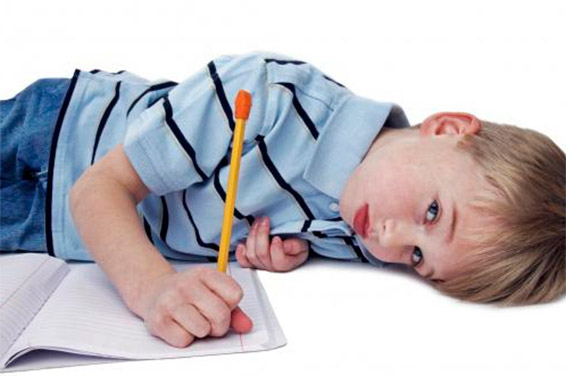
For children with developmental disabilities (delayed mental development, children with visual or hearing impairments, cerebral palsy, etc.), even if they were admitted to secondary school and a regular mass class (inclusive), a special training program must be selected and developed.
Fatigue and asthenic symptoms in a child are also a factor contributing to the child’s poor performance at school. Pay attention to the child's workload. Is it too big? There are so many opportunities around now additional education and the development of the child, that few parents do not try to take advantage of this opportunity.
It’s really great when, in addition to the main program in a kindergarten or school, you can allow your child to gain new knowledge, skills and abilities in different clubs, sections and additional classes. (You can read more about choosing a section and clubs for a child in the article.) But sometimes such a load on a child can cause him fatigue and exhaustion.
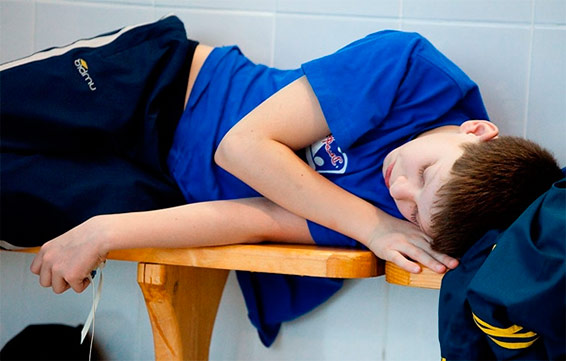
Look at your child's activity schedule. Is your baby busy? Or maybe you think that this doesn’t exhaust him too much? Perhaps we should eliminate English 3 times a week or leave dancing 2 times a week, but cancel figure skating?
But before you cancel all classes altogether, look at how he does them? Do they bring him the pleasure that he does not get from school? Is he successful in his circle? If yes, then there is no need to cancel them.
Then his motivation to further studies and his self-esteem may suffer greatly. And if you decide that music lessons, for example, bring him pleasure, but they are too frequent (5 times a week), you can simply reduce them to 3 times, for example.
Fatigue, drowsiness, colds - it’s no secret that all this affects the baby’s performance. No matter how banal it may sound, but “B healthy body- healthy spirit! Healthy child can cope with the tasks assigned to him. Moreover, healthy not only physically, but also mentally.
Personal qualities of the child
There may be several reasons leading to problems with studying:
The child was not ready to enter school
And here I would also highlight 2 points:
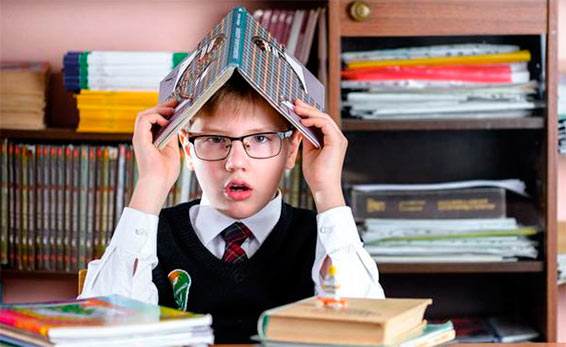
Here are two examples:
- Family of farmers. The child is 8 years old. He knows how to dig, drive a tractor, knows the basics of crafts, but does not know how to read. From birth, his father instills in him skills that will be useful to him in life. future life farmer, putting this first. But there is simply not enough time to get acquainted with the alphabet.
- City family. Dad works as a director of a company, mom is a housewife, it is possible to hire a nanny and tutors. But the parents don't want to. They should teach at school, they say. Let him at least rest before school and do whatever he wants, then life will teach him that way. And we give our child a happy and carefree childhood.
Sounds really nice, don't you agree? True, these are all illusions. Firstly, not only teachers, but also parents are responsible for teaching at school. Secondly, in real life the school takes already prepared children.
Emotional state of the child. The child is anxious or agitated
This is a very broad reason. The child may be frightened by changes in the family (divorce, birth of a brother/sister, moving, death of a loved one, etc.). Something happened in his life that scared him greatly. Or he is acutely experiencing the teenage period (unrequited love, relationships with peers, conflicts with parents), etc.

Of course, as you yourself understand, during this period the child does not want to study at all. Other tasks are more important for him now. Here an adult can help solve the problems that have arisen for the child and only then improve their studies.
Unfortunately, I often hear from parents and teachers that all this unrequited love or moving - “This is all nonsense!”, “Get involved in your studies faster!” Understand that he cannot do this. Put yourself in his shoes. And help him cope with the flurry of feelings that are boiling inside him.
Sometimes a child begins to study poorly in order to attract attention from his parents. Perhaps he needs your support now? Or is he protesting against too many prohibitions in his life and doing everything in defiance? Or does he understand that “becoming an excellent student” is his mother’s unrealized dream, which he must now bring to life?
Social reasons
Conflicts at school
The relationship with the class did not work out . For example, they call you names and consider you a black sheep. When the whole class teases you, you don’t think about examples at all in class. Most likely, the following thoughts are sitting in your head: “how can I go home as quickly as possible?”, “why are they mad at me?”, “how to take revenge on them?”
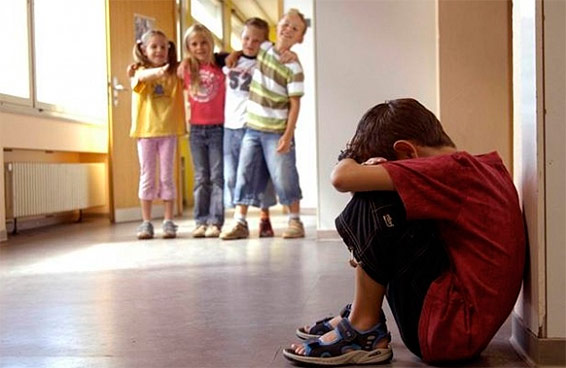
Or conflict with teacher . The teacher simply disliked the child. He finds fault and, instead of helping to understand the subject, he nags and, on the contrary, overwhelms him with difficult tasks. There are teachers from God. And there are ordinary people, which can sometimes also break down. And in this case, this is reflected in our children.
Not suitable program
It can be either too simple or, conversely, too complex. The child is bored. This can happen for several reasons.
- The baby began to be taught/developed too early. He learned letters at the age of three. And now he is not interested in this activity, the learning process is unpleasant, he wants to play.
In this case, the child should be given the opportunity to “play enough” to his heart’s content. Do not prohibit games, but encourage and develop them, gradually, very gradually transferring them into educational activities.
- The child quickly grasps and easily masters the school curriculum. Then during lessons, if there is no individual approach, he gradually begins to count crows. After all, the tasks already seem too simple and uninteresting to him. And then, when the program becomes more complicated, he does not have time to connect and gradually slides into twos and threes.
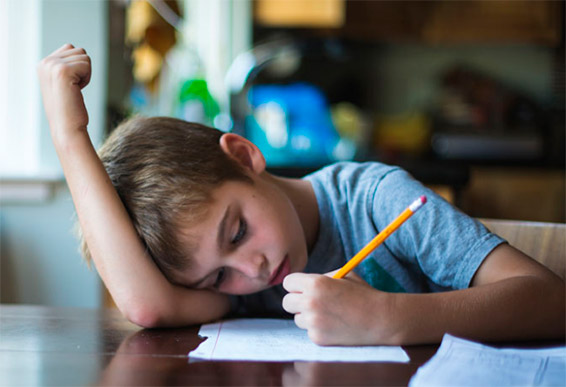
So, to the question “Why does a child study poorly?” We tried to answer you. There may be one reason, or maybe several. For example, a child has entered adolescence, is tense, and then there is a new math teacher who has changed the curriculum and grading system.
A child is doing poorly at school: what to do?
Now the next logical question arises: “What to do about it?”

What if he doesn’t get enough of your attention? Think, what is the benefit for him? He studies poorly, you neglect personal matters, and spend all your time with him trying to figure out his lessons. Isn't this the reason? Help, but don't do everything for him.
A short summary: if your child begins to study poorly, do not rush to scold him. Try to understand why this happens? What distracts and worries him? Remember, by joining forces rather than conflicting, you can quickly find a solution to any situation.








